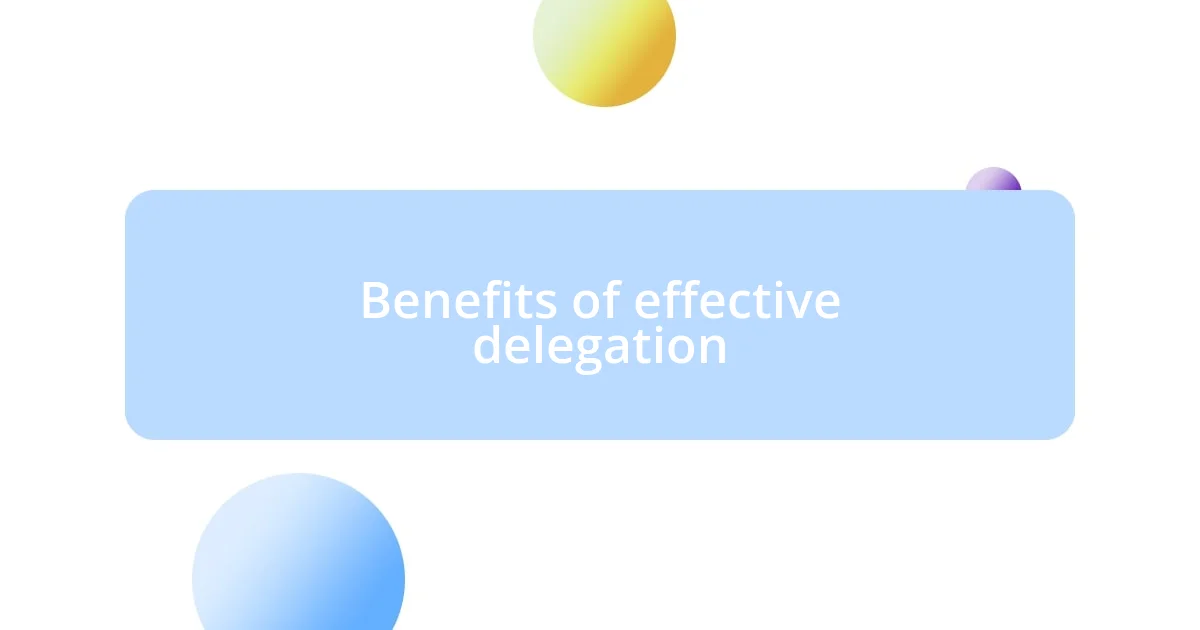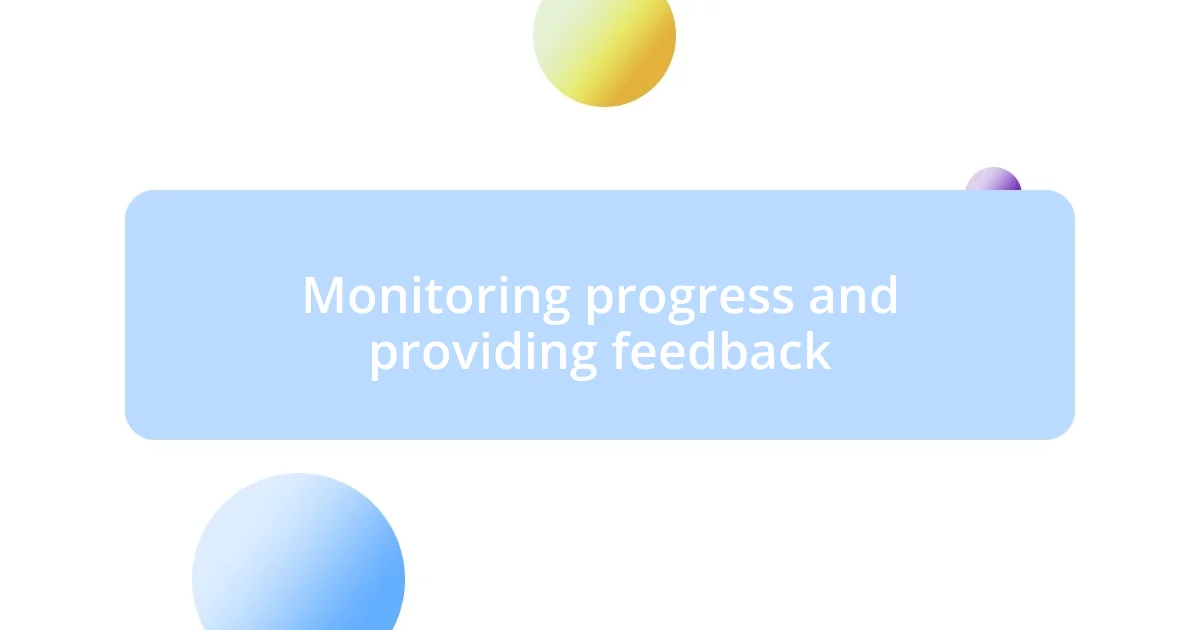Key takeaways:
- Effective delegation involves entrusting tasks to team members, fostering their growth, and enhancing overall productivity while building a motivated team.
- Clear communication of expectations and regular feedback are essential for successful delegation, ensuring alignment and engagement within the team.
- Choosing the right tasks to delegate and matching them with the strengths of team members leads to higher job satisfaction and promotes a healthy workplace culture.

Understanding the concept of delegation
Delegation isn’t just about offloading work to others; it’s a strategic decision that can redefine how we manage tasks and teams. I remember a time when I hesitated to delegate a project because I thought no one could do it quite like me. That mindset took a toll on my productivity and left me feeling overwhelmed. Isn’t it fascinating how we sometimes cling to the belief that we are the only ones who can succeed in certain tasks?
At its core, effective delegation means entrusting others with responsibilities while providing them the tools and authority they need to succeed. I’ve found that when I delegate, I’m not simply shifting tasks; I’m actively engaging team members and fostering their growth. Have you ever considered how empowering someone to take charge can lead to unexpected innovations and insights? It’s exhilarating to watch someone surprise you with their creativity when given the freedom to explore.
Moreover, understanding delegation involves recognizing the strengths and weaknesses of your team members. I’ve made mistakes in the past by assigning tasks without considering their individual skills, leading to frustration for both parties. Reflecting on these experiences made me realize that communication is key—asking, “What do you enjoy doing?” or “What do you excel at?” can reveal so much about how to delegate effectively. It’s not just about getting things done, but about building a motivated and capable team.

Benefits of effective delegation
One of the primary benefits of effective delegation is that it significantly enhances overall productivity. I recall a period when my workload felt insurmountable, and instead of trying to tackle everything myself, I finally decided to share my responsibilities. The sense of relief and the immediate improvement in efficiency were striking. It taught me that by involving others, we can accomplish so much more than we ever could alone.
Another advantage I’ve experienced is the development of team skills. When I delegate tasks, it opens up opportunities for my colleagues to learn and grow. I remember assigning a challenging project to a newer team member. Initially skeptical, I was amazed to see them not only rise to the challenge but also bring fresh perspectives I hadn’t anticipated. This not only boosted their confidence but fostered a collaborative spirit within the team, making us all stronger.
Lastly, effective delegation can lead to increased job satisfaction for everyone involved. Taking work off my plate not only relieves stress but also allows me to focus on strategic aspects of my role. I’ve noticed that when people feel trusted with responsibilities, their engagement and morale soar. It’s a win-win situation; while tasks are completed efficiently, team members also feel valued and empowered, which is vital for a healthy workplace culture.
| Benefit | Personal Experience |
|---|---|
| Increased Productivity | Shared tasks led to remarkable efficiency improvements. |
| Skill Development | Delegating to a newcomer revealed their hidden talents. |
| Job Satisfaction | Trusting others fosters engagement and morale. |

Identifying tasks to delegate
Identifying the right tasks to delegate can be a transformative experience. When I first started delegating, I often felt overwhelmed, unsure of what to let go. It took some reflection to realize that not every task had the same impact on my goals. I found it helpful to categorize my tasks based on urgency and importance. This distinction allowed me to pinpoint specific activities that could be entrusted to others.
Here are some key tasks that can often be delegated effectively:
- Routine Administrative Work: Tasks like scheduling meetings or managing emails can consume valuable time without leveraging my unique strengths.
- Research and Data Analysis: If I need insights for a project, delegating the data gathering can speed things up while involving others in the process.
- Content Creation: Whether it’s drafting reports or creating presentations, I’ve noticed that bringing in team members can lead to fresh ideas.
- Customer Communication: Engaging with clients can be distributed based on specific expertise, allowing team members to take ownership while I focus on strategic discussions.
In my journey, I’ve discovered that identifying these tasks not only lightens my load but also empowers my team. Reflecting on my past challenges, it’s clear that once I let go of the urge to control every detail, I not only improved my productivity but also encouraged growth within my team. Seeing them thrive has genuinely been one of the most rewarding aspects of delegation.

Choosing the right team members
When it comes to choosing the right team members for delegation, I’ve learned to trust my instincts about people’s strengths. For instance, I once had a colleague who thrived on creative problem-solving, while another was detail-oriented and excellent with numbers. Understanding these dynamics made it easier for me to assign tasks that matched their skills, leading to not just better outcomes, but also to a renewed enthusiasm within the team. Have you ever noticed how energized people can get when working on something they genuinely enjoy?
Another key factor is assessing the readiness of team members to take on more responsibility. I recall a time when I hesitated to delegate a critical project because I doubted a team member’s capabilities. However, I ultimately decided to give them a chance. The result? Not only did they exceed my expectations, but they also expressed gratitude for the trust placed in them. It was a reminder for me that sometimes, people just need an opportunity to shine.
Finally, I always consider the potential for growth in my team. Choosing members who are eager to learn and adapt can lead to a more versatile and resilient team. I vividly remember a situation where I assigned a project to someone I knew was on a learning curve. With the right support, they not only completed the project but also developed skills that benefited the entire team. This experience reinforced my belief that delegation is not just about offloading tasks; it’s also about cultivating future leaders within the organization. What unexpected talents might you uncover in your team if you give them the chance?

Communicating expectations clearly
Communicating expectations clearly is a fundamental aspect of effective delegation. I distinctly remember a project where I assumed my team understood the objectives, only to find we were all on different pages. It became evident that providing detailed instructions and addressing everyone’s roles upfront could have saved us from confusion and misalignment. Have you ever experienced that moment when you thought your directions were clear, only to realize their interpretation was vastly different?
When I started focusing on clearer communication, I began outlining specific goals, deadlines, and quality standards for each task. For instance, I once delegated a marketing campaign to a team member, but it was only after providing examples of what I envisioned that we truly aligned on creative direction. Sharing these insights made them feel more confident in executing the tasks, and it led to a beautifully executed campaign that exceeded our initial expectations. Isn’t it fascinating how a simple conversation can transform outcomes?
Additionally, regular check-ins became a crucial practice. I’ve found that asking for updates and inviting questions as the project unfolds can clarify any uncertainties before they snowball into larger issues. One time, during a complex project, quick catch-up meetings made all the difference in keeping our progress on track. This approach not only solidified our alignment but also fostered an environment of open dialogue, which ultimately nurtured my team’s engagement and ownership over their work. How do you ensure your team feels comfortable discussing challenges as they arise?

Monitoring progress and providing feedback
Monitoring progress is crucial to ensure that delegated tasks stay on track. I once managed a team where I set up a simple tracking system. It involved a shared document that everyone updated weekly. Surprisingly, this not only kept everyone accountable but also fostered a sense of accomplishment as we visually saw projects progressing. Have you ever tried something similar, and noticed how it boosted your team’s motivation?
Providing feedback also plays an essential role in monitoring progress. I remember a time when I overlooked giving constructive feedback during a project review. The result? My team felt uncertain about their performance and direction. Since then, I’ve made it a point to offer timely, specific feedback, highlighting both strengths and areas for improvement. Honestly, seeing their reactions when they receive recognition for hard work is incredibly fulfilling. How do you think simple words of encouragement might shift the morale within your team?
Lastly, I’ve learned that being open to two-way feedback creates a culture of growth. I had a team member once express frustration about unclear expectations, which prompted me to reevaluate my communication style. It was eye-opening and helped me adapt my approach, leading to a more engaged and productive team. This dialogue not only improves their performance, but it also deepens trust. Isn’t it amazing how creating space for feedback can transform the dynamics of collaboration?

Overcoming common delegation challenges
One common challenge in delegation is the fear of losing control over the task. I remember the time I hesitated to delegate a critical report because I was worried about how it would turn out. But then, I realized that micromanaging only stifled my team’s creativity and slowed us down. Have you ever held onto a task too tightly, only to find that letting go could lead to better results? Learning to trust my team was vital, and seeing them step up to the challenge often surprised me with their innovative approaches.
Another obstacle is the tendency to underestimate the complexity of certain tasks. During one project, I assigned a website redesign without fully understanding the technical intricacies involved. This oversight left my team floundering and stressed. It made me see that taking time to evaluate the skills required can prevent overwhelming my team. Do you ever take a moment to assess the challenge ahead before delegating? I find that a little upfront analysis can go a long way toward ensuring smoother task execution.
Finally, addressing mismatched skill sets can be tricky. I once delegated a presentation task to a team member who thrived in behind-the-scenes roles but struggled with public speaking. It was a rude awakening for both of us. Since then, I make it a point to align tasks with team members’ strengths and preferences. How do you assess your team’s individual capabilities? I’ve found that recognizing these nuances not only boosts confidence but enhances overall team effectiveness.














